
One of the biggest challenges in solo roleplaying – especially in an old-school Dungeons & Dragons style game – is deciding what your sessions are about.
Without a GM guiding the flow, you, as the lone player, get to decide which aspects of the game world deserve the spotlight.
This is one of the great strengths of solo roleplaying: you get to decide what you want to do.
And while this freedom is powerful, it can also feel overwhelming as you end up having too much to choose from.
A Useful Approach: Foci
One useful approach to combat this overload, and make the solo experience much more engaging for you, is to choose a focus for your solo play.
You can think of a focus as the lens through which you view the adventure, or campaign. In other words, what you will be spending most of your time on.
In this post I want to highlight various different foci, how to use them, some tools you can use to help you focus on them, and which type of person they may be best for.
I am hoping after you read this article, it will allow you to play more solo sessions, and even start a solo campaign.
The areas I wanted to showcase are:
-
-
- Character-Centric Play
- Exploration & Discovery
- Resource Management
- Faction & Domain Play
- Worldbuilding in Motion
- Challenge & Tactics
- Campaign Chronicle
- Atmosphere & Mood
-
A few words of advice before we jump into the specific foci.
Advice on Using the Foci
You don’t have to pick just one focus and stick with it forever. You don’t even need to just stick with one during a session.
Many solo campaigns shift naturally between them – at one moment you’re charting a dungeon room by room, the next you’re worrying about faction politics, and then you’re knee-deep in a deadly battle.
By thinking about your focus before you start however, you give yourself a direction. In solo play, that direction can be the difference between an abandoned notebook and a living, breathing campaign.
Finally, this is far from an exhaustive list. You may have others that you like – go with what makes you happy. After all, you are the only one you need to please.
Solo Roleplaying Foci
1. Character-Centric Play
Focus
The growth, struggles, and story of a single PC (or even a small party).
This focus is probably the default one most people think of when they think about solo roleplaying. Focusing on the character or characters on the adventure. And focusing on how they grow and develop.
How
Keep detailed journals or “in-character” logs. Roll reactions*, morale, and random events to simulate the world pushing back. Let choices reflect your character’s personality, flaws, and ambitions.
* Check out Issue 11 of d12 Monthly for more on NPCs and reaction rolls.
Tools
Character diaries, solo oracles (e.g. Mythic, simple yes/no tables), and detailed downtime activities.
Best For
Players who enjoy immersive storytelling and role immersion. And for those who want more than just a dungeon crawl or a hackfest.
2. Exploration & Discovery
Focus
The dungeon, wilderness, or hex map itself.
The focus on this sort of solo play is the map. The characters matter, but they are more or less just a vehicle to get to new areas and uncover new places. The characters are more dispensable and can be easily replaced.
How
Use random encounter tables*, dungeon stocking methods, and hex-crawling procedures. Document discoveries, rumours, and maps. Treat the unknown as the main character.
* Check out Issue 27 of d12 Monthly for more on creating encounter tables.
Tools
Old-school random generators, wandering monster checks, reaction rolls, and dungeon geomorphs.
Best For
Players who enjoy procedural play and “emergent storytelling” where the environment takes centre stage.
3. Resource Management
Focus
Supplies, hirelings, logistics, and survival.
While this won’t appeal to a lot of players, it is an important part of exploration. This also involves a lot of roleplaying as the characters try to secure supplies and encourage NPCs to join them on their quest.
How
Track torches, food, coin, and encumbrance rigorously. Let scarcity shape decisions. Play out resupply trips and negotiate with merchants or townsfolk.
Tools
Encumbrance rules, inventory sheets, and downtime costs.
Best For
Players who love the gritty, survivalist side of old-school Dungeons & Dragons.
4. Faction & Domain Play
Focus
The shifting politics of the world and your PC’s place in it.
This focus is all about zooming out and going back to D&D’s roots in many aspects. Instead of focusing on a single character or party of characters, the focus is on kingdoms, political manoeuvring, and strategy.
How
Treat factions, guilds, and kingdoms as characters with goals. Use random events, wargame rules, or matrix games to simulate their actions. Your character can align, oppose, or manipulate them.
Tools
Reaction rolls for faction interactions, rumour tables, and simple wargame mechanics.
Best For
Players who want to run a “big picture” game or transition from adventurer to lord.
5. Worldbuilding in Motion
Focus
Growing the setting piece by piece as you play.
One of my favourite foci, this builds your campaign world as you adventure. Mapping out new areas of your world, creating new places, and new lairs for insidious masterminds and monsters becomes the focus.
How
Don’t over-prep. Roll for towns, NPCs, or ruins as they’re encountered. Use random generators and word tables to surprise yourself. Write your setting as a living travelogue shaped by the dice.
Tools
Dungeon stocking tables, NPC name lists, rumour generators, hex fills, word tables.
Best For
Players who want their world to feel alive and mysterious even to themselves.
Solo Roleplaying Essentials:
6. Combat & Tactics
Focus
Combat encounters, tactics, and problem-solving.
If you like large scale battles, then this focus may appeal. It’s about testing your mettle and strategies against opposing armies.
How
Frame play around tactical challenges and set-piece battles. Play monsters smart but not omniscient. Randomize terrain and complications to keep encounters fresh.
Tools
Tactical maps, monster morale rules, reaction rolls, and random terrain tables.
Best For
Players who like the “game” side of the game – fair fights, clever solutions, and dice-driven tension.
7. Campaign Chronicle
Focus
The long arc of play, not individual moments.
Another of my favourite foci, instead of looking at individual actions, you instead look at longer time-frames and record summaries of activities, rather than capturing the minutiae.
How
Treat solo sessions as chapters in a larger saga. Record summaries rather than blow-by-blow accounts. Roll for seasonal events, wars, plagues, or changes in fortune between adventures.
Tools
Downtime events, domain rules, carousing tables, seasonal campaign procedures.
Best For
Players who want to see a living, evolving world over months or years of play.
8. Atmosphere & Mood
Focus
The feel and tone of your game.
For those who like immersing themselves into their session, this focus can really deliver if done right. Various music and lighting choices can really add to the mood of the session.
How
Decide up front what kind of vibe you’re chasing – grimdark survival, fairy tale whimsy, sword & sorcery grit – and choose random tables and descriptions that reinforce it.
Tools
Music, art inspiration, evocative generators (weather, omens, superstitions).
Best For
Players who want their solo play to feel like stepping into a specific kind of story-world.
Combining Foci
It is likely that you will favour more than just one of the above foci. This means you can easily combine two or three of them together.
In my case I tend to focus on world building and campaign play, so these two often become my focus for sessions.
You could love creating an atmosphere and have a character-focused session. Or, maybe you are into more domain play with large-scale battles.
The greatness of this system is you can mix and match as desired.
Over to You
Do you find yourself using any (or all) of these foci in your solo roleplaying sessions? Which is your favourite? Let me know in the comments down below.
While You’re Here…
Since 2021 I have been publishing d12 Monthly, a monthly zine, which has a ton of articles for any edition of Dungeons and Dragons.
Printed copies are available in my store. The PDF is available on DriveThruRPG and you can get both, plus support my work, via my Patreon.
I will also be releasing some more products in the near future.
Feel free to reach out to me on Twitter or my contact page any time.

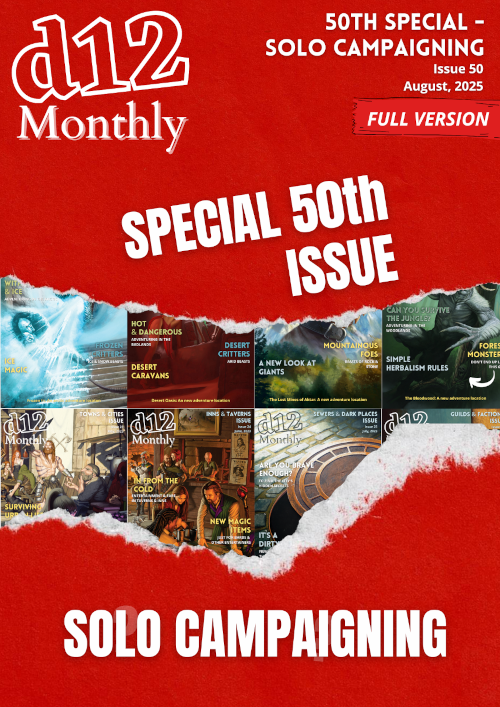
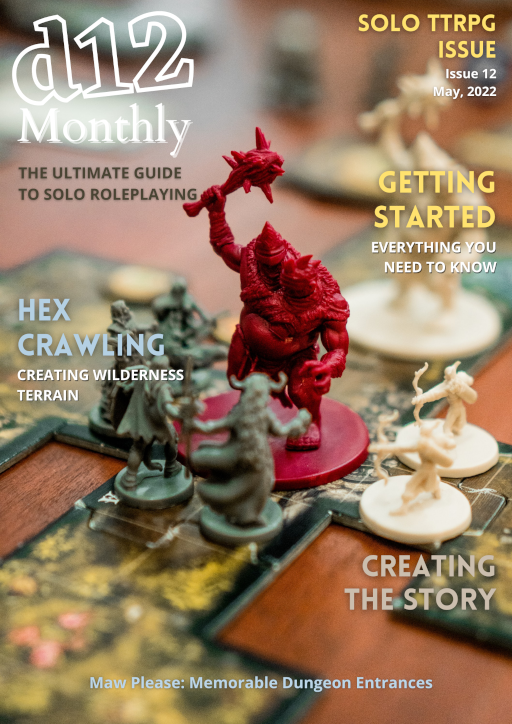
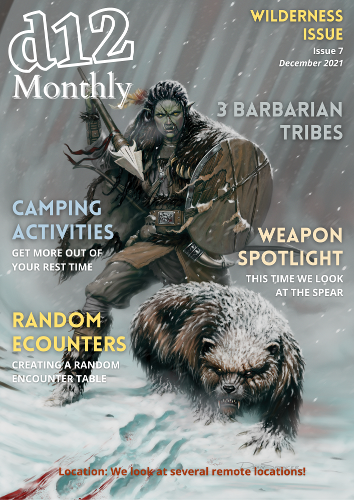
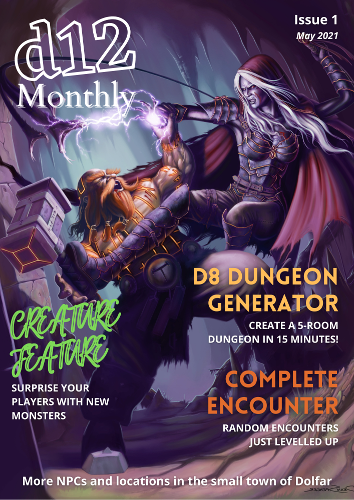
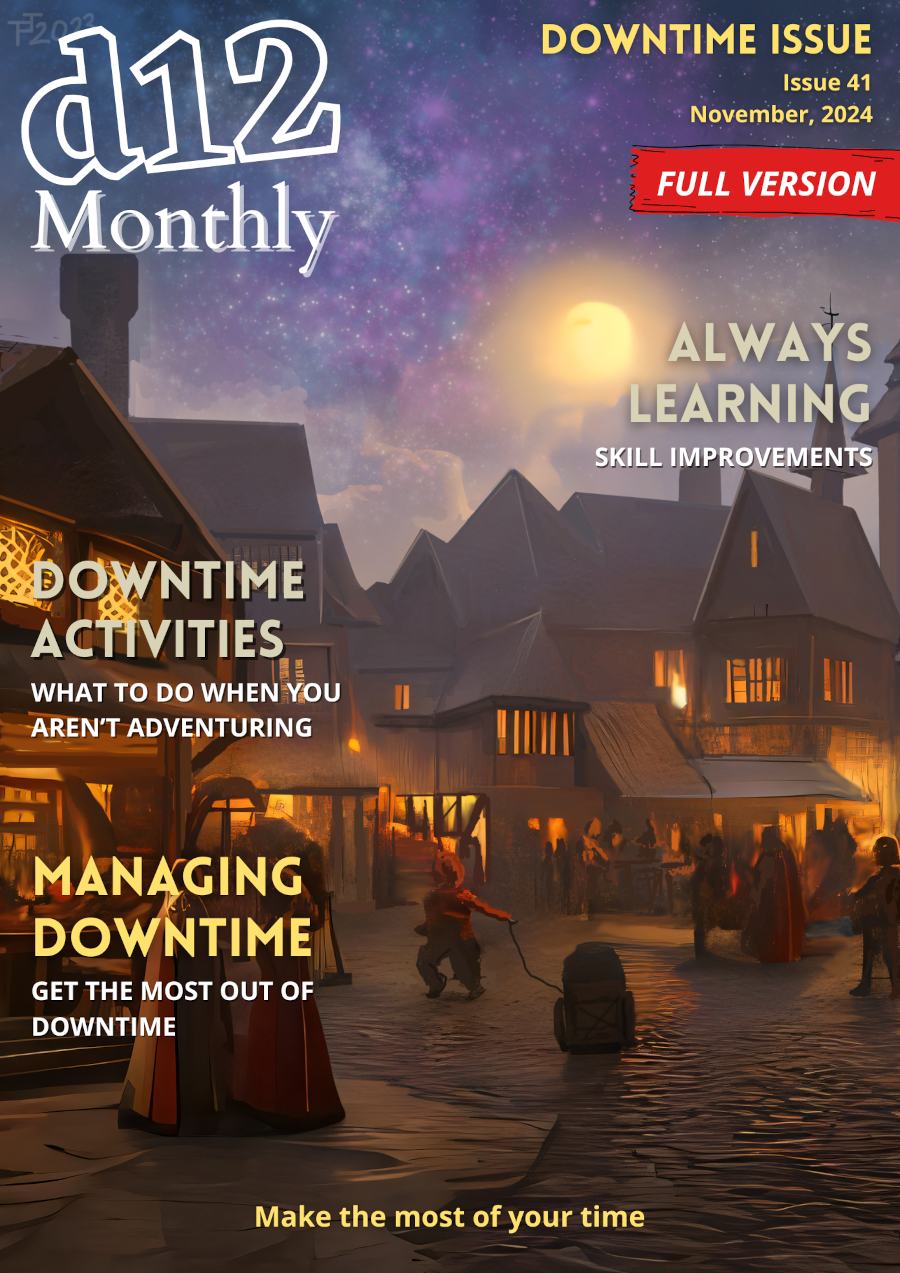
Some good advice there, and its not limited to fantasy. These steps should work for any genre.
Definitely.